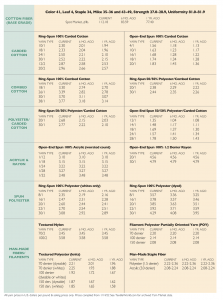 By Jim Phillips, Yarn Market Editor
By Jim Phillips, Yarn Market Editor
Yarn demand remains strong across the board, with many spinners, depending upon labor availability, operating at or near capacity.
“The biggest problem remains available human resources,” said one executive. “Even before COVID, many plants were struggling to fill positions. Essentially, it’s been one thing after another, from shutdowns, to enhanced unemployment benefits, to, now, the highly contagious Omicron variant of the disease, which is causing a lot of absenteeism.”
The good news, according to scientists and medical experts, is that the new variant, while more contagious, generally produces less severe symptoms. Also, countries, such as South Africa, that first reported a meteoric rise in Omicron, are now reporting the variant is subsiding just as quickly.
Since the beginning of the pandemic, governmental leaders, scientists, health officials and companies have worked diligently to ensure that, should such a situation develop in the future, nations will not be caught short-handed in their ability to protect their citizens. At the beginning of the COVID-19 pandemic, protective medical gear is such short supply that even critical first-line healthcare workers were not adequately protected.
Medical Textiles Production To Increase
NCTO worked with the U.S. government to ensure the future onshoring of personal protective equipment (PPE) manufacturing. Now, it seems, the rest of the world is on board in increasing overall medical textiles production. According to a new study by market research company Technavio, the medical textiles industry is expected to increase by $3.36 billion from 2020 to 2025. That accounts for a compound annual growth rate of more than 5 percent.
As the study indicates, medical textiles include PPE and a wide range of other products. Nonwoven medical textiles are utilized in items such as absorbent pads, incontinence products, and patient and staff attire. Baby diapers, bed linen, blankets burn dressings, gowns, disposable underwear, dressings, medicine delivery devices, face masks, filter media, nasal strips, pillows, shoe covers, sponges, sutures, tissue scaffolds, towels, wraps, and other products include these substances.
Natural and synthetic fibers are employed in the production of nonwoven medical textiles. Wood-pulp, cotton, and rayon are examples of natural fibers used in non-woven medical textiles. Wood pulp is used because of its obvious absorbency, mass, and low cost, whereas cotton and rayon are soft enough to be used on wounds directly.
Taking Care Of The Environment And People
Last month, it was reported that, Unifi Inc. — among the textile industry’s leading innovators in recycling and sustainability — has now transformed more than 30 billion post-consumer plastic bottles into its REPREVE® brand recycled performance fibers that are used by hundreds of the world’s leading brands. In addition to Unifi, a number of other companies are undertaking far-reaching sustainability initiatives. For example, Elevate Textiles, a global provider of advanced, high-quality products and mission critical textile solutions, recently became the first global textile manufacturer to receive validation of its Science Based Target (SBTi) goals related to reducing greenhouse gas emissions at the highest recommended levels.
As part of its commitment, Elevate recently increased its original greenhouse gas emission reduction target from 2.5 percent to 4.2 percent per year across its portfolio brands of American & Efird (A&E), Burlington, Cone Denim, Gütermann and Safety Components.
Not only are companies in the industry investing in maintain a cleaner, sustainable environment, but they are also working to help better their communities in other ways. Standard Textile Co. Inc., which serves the healthcare and hospitality textile markets, announced on January 18 a national program to combat homelessness. Through partnership with non-profit organizations across the United States that provide mobile shower services to people dealing with homelessness or insufficient housing, the company met its goal of supporting 80,000 showers by the end of 2021.
“On any given day, more than a half million Americans experiencing homelessness may not have regular access to basic essentials many of us take for granted, including a shower or a soft towel. A shower can do so much more than offer personal hygiene; it can restore dignity, something everyone deserves,” said Gary Heiman, Standard Textile’s President and CEO.
Fiber Industries Expands
Fiber Industries in mid-January announced plans to expand operations in Darlington County, S.C. The company’s more than $30 million investment will create 50-plus new jobs.
A full-service manufacturer, Fiber Industries produces polyester staple fiber for high-end performance fabrics, workwear, knit goods, the automotive industry and more.
Currently employing more than 300 people, Fiber Industries’ expansion includes increased capacity through the restoration and modernization of production lines. The company will also use the additional investment to install state-of-the-art control systems and increase warehouse space.
The expansion project is expected to be completed in early 2023.
“We are excited about the continuing growth of our facility which is now even better positioned to serve the needs of the American textile industry,” said Fiber Industries CEO Don Bockoven. “We also are proud to be part of the wider effort to reshore jobs and bring textile manufacturing back to the USA. We thank the state of South Carolina as well as Darlington County for their unwavering support.”
January 2022





